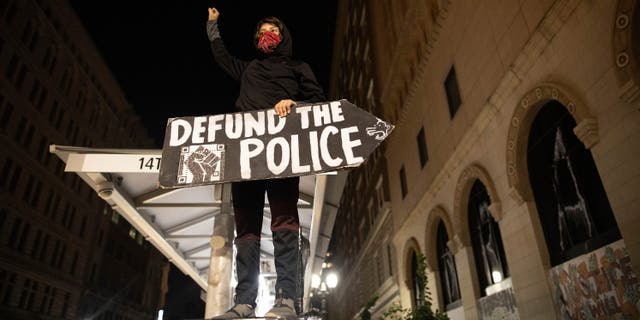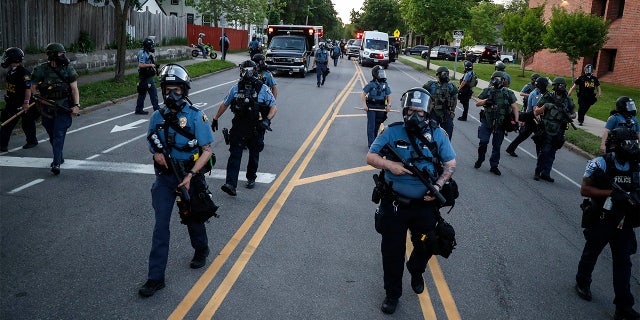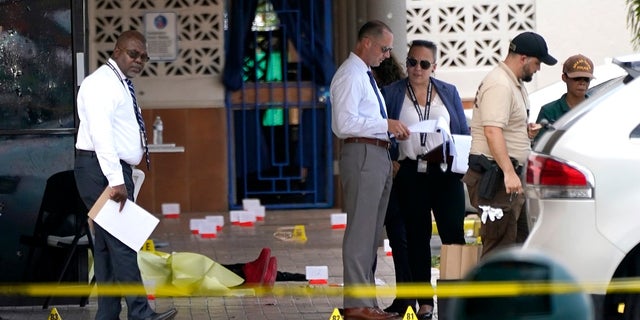Evolution of the 'defund the police' movement: How has it changed?
Some cities facing backlash after defunding police departments
Cities reeling from violent crime and related woes after defunding local police departments.
More than one year since the death of George Floyd sent shockwaves through the nation, experts say the movement to slash police budgets amid calls for law enforcement reform has struggled to maintain momentum amid concerns about public safety and costs to local governments.
Fox News spoke to a handful of law enforcement analysts for their input on how the movement to “defund the police” – a phrase seen emblazoned on signs at protests night after night and in city after city – has evolved over the months since it grew to become a rallying cry following Floyd’s death on May 25, 2020. Some experts contended the public’s efforts toward pursuing desired changes have gradually lost steam in parts of the country, as cities realize doing so will take time, cost money and require a thoroughly crafted strategy.
“We tend as a society to have short attention spans,” said Dennis Kenney, Ph.D., a professor at New York City’s John Jay College of Criminal Justice. Kenney is a former Florida police officer and an author with more than 35 years of experience working with or examining law enforcement, including as director of research for the Police Executive Research Forum.
A protester holds a sign calling for the defunding of police at a protest on Saturday, July 25, 2020, in Oakland, Calif. (AP Photo/Christian Monterrosa)
When asked if interest in efforts to cut police budgets remained, or if people were backing away from the idea, Kenney used Minneapolis, Minnesota, where Floyd was killed, as an example. He described how the city first planned to do away with its police department altogether, then realized “that’s probably not the best idea because we don’t have anything to replace them.” He explained that their plan was then to reimagine policing, but that also required the creation of new entities to take the police department’s place.
Then came the realization that “that’s going to be expensive. It’s going to mean an awful lot of things.”
“I think that’s what people are backing away from,” he continued. “I think that they can see that, OK the police aren’t well-designed to do that, but we can get them on the cheap, so let’s leave it with them.”
Kenney noted that the meaning of defunding police typically “depends on who you’re talking to,” but said that “at the extreme end,” was those who wanted to do away with police altogether and instead enlist civilians to take their place. “I think that was never a viable option and never had a large amount of support,” he added.
“Defunding tended, I think, in the majority opinion tended to be focused on kind of reformatting what we did with the police and recognizing that many of the things that we dump on police to handle, they’re not well-suited to do,” he explained. Kenney pointed to instances in which officers are dealing with people experiencing mental health crises as an example.
Police officers clear a section of Hamline Avenue in riot gear, Thursday, May 28, 2020, in St. Paul, Minn. (AP Photo/John Minchillo)
(AP)
That situation is “not something that police are particularly well-designed to handle – they’re not trained for it, they’re not prepared for it. But the problem the police have is, there’s no one else to do it. So, ‘if not us, then who?’ is basically the argument.”
The lack of having anyone else to handle such areas has led to “pushback,” Kenney continued.
“The difficulty … comes in, not do you believe it? But, what are you prepared to do about it?” he said. Kenney said he believed most people argued either that “removing the police for handling problems is going to lead to exacerbation of those problems,” or the alternative, the people’s belief that departments should instead hire unarmed crisis counselors.
“But that means we have to have a staff of unarmed crisis counselors on duty, ready to respond. And that’s expensive,” he explained. “And we’re not willing to do that.”
All in all, he said, even if the support is there, “there’s certainly no consensus on what should be done.”
At the same time, many cities nationwide have seen upticks in violent crime that have, in many cases, remained steady throughout the past several months.
Kenney and Dr. Lorenzo Boyd, the University of New Haven’s vice president for diversity and inclusion, said they do not the crime increased should be attributed to the police budgets cuts.
Boyd, who worked as a police officer in Massachusetts for 14 years, is an expert in police-community relations and urban policing, among several other areas of law enforcement. He is the former director of the University of New Haven’s Center for Advanced Policing and serves as the university’s chief diversity officer.
Law enforcement officials work the scene of a shooting outside a banquet hall near Hialeah, Fla., on May 30, 2021. (AP Photo/Lynne Sladky)
(AP)
He referred to police budget cuts instead as “resource reallocation,” and noted that “everybody wants safe policing, but people want better policing.”
“Crime rates are going up because people have been pent up in their houses for a year and now they’re starting to come back out again,” Boyd told Fox News. “But there is absolutely no correlation between, or a spurious correlation between, crime rates going up and budgets being cut.”
But some police officials have said otherwise. Just this week, Los Angeles County Sheriff Alex Villanueva railed against the Board of Supervisors as they mull whether or not to slash the department’s funding further.
LASD’s 2021 budget shrunk by $145 million last year, with Villanueva estimating the department lost 1,130 positions. He added that the Board of Supervisors plans to decrease the department’s budget by an additional $143 million and 77 police positions. Villanueva is asking for a $3.6 billion budget, he said.
“We have been defunded, degraded. Our capacity to fight crime, investigate crime and hold people accountable when they commit a crime – all that is going downhill. And not to the benefit of the residents of L.A. County,” Villanueva said in a video shared on social media. “As you can judge by the numbers, they are going in the wrong direction.”
Murders in the county have spiked by 95.24% so far this year compared to the same time in 2020, while the department also saw increases of 40.11% in grand theft auto, 22.40% in arson, 12.94% in aggravated assault and 7.82% in forcible rape, Villanueva said.
But Boyd, who said he previously worked as a police union official himself, denounced such claims by law enforcement brass and unions as being motivated by the effort to get better funding for their members.
When asked if the effort to cut funding to police is still as strong now as it was last summer, Boyd used the city of Seattle to describe how some municipalities have made themselves “look bad” for cutting the police budget without having a plan in place.
“The city of Seattle decided, ‘We’re going to start defunding the police, we’re going to cut the police budget.’ But the City Council had no real way of doing that,” he said. “They decided, they’re just going to cut a bunch of money right off the top, as opposed to surgically deciding this is where extra money is, this is where we can reallocate things.”
Boyd added: “But then they cut a bunch of money for no apparent reason. And then, now crime’s going up [post-COVID] … And now they’re saying, ‘OK, we don’t know what to do. Now we look bad because we didn’t have a plan. OK, let’s go and give them the money back and let’s rethink this.’”
He also agreed with Kenney in that Americans, he said, “tend to have these really short memories, and we deal with the flavor of the month.”
Charles Lehman, a fellow at the conservative Manhattan Institute with a focus on its Policing and Public Safety Initiative, told Fox News there was not “really any consensus around what alternatives to policing look like,” other than a handful of “vague ideas” that don’t “hold up to scrutiny.”
“As ever in politics, there’s a lot of desire to do something. And for lack of either ideas, for lack of success in the space, a particularly radical slogan caught on and then people got bored and went home,” he said.
Lehman said any person who is part of the “activist fringe” that is committed to the ideology “will continue to agitate for it when the opportunity arises.” He called defunding the police “overwhelmingly unpopular.”
“We know from study after study after study … the police presence is just the best crime deterrent tool that we have. It works better than basically everything else,” he continued. “If there are fewer cops on the streets, there’s going to be a greater number of offenses. We also know that the nationwide homicide spike started last June and it’s been persistent since then. It’s really hard to say there is a cause there other than all the protests and all the pressure, public pressure on police.”
Source: Read Full Article





